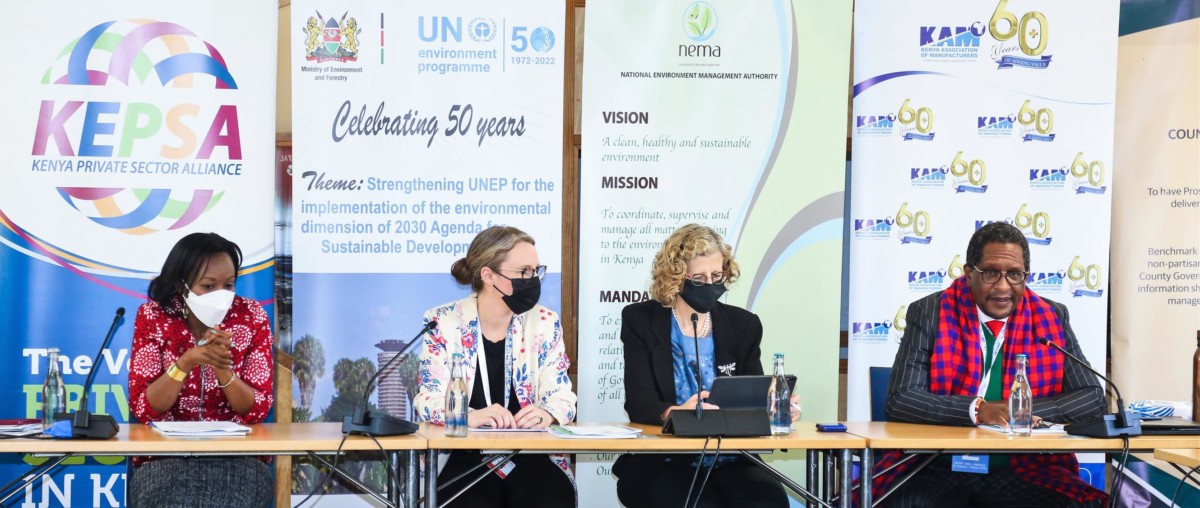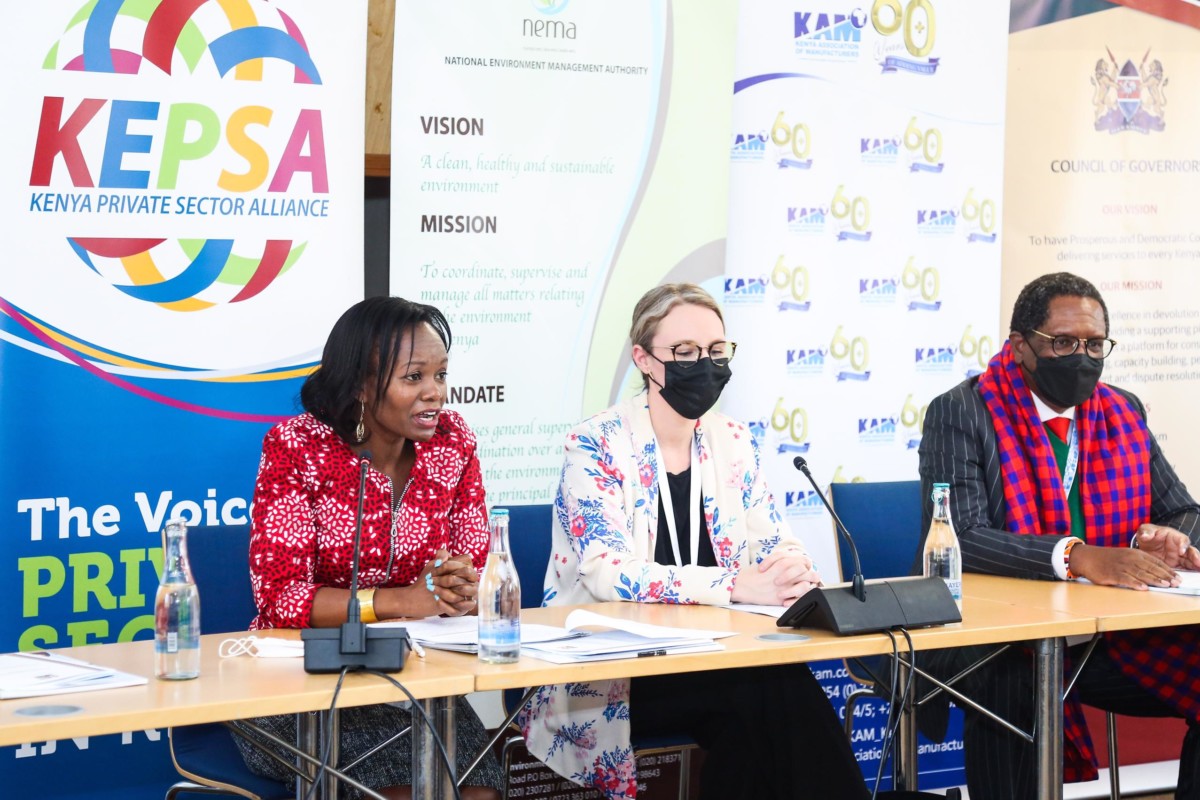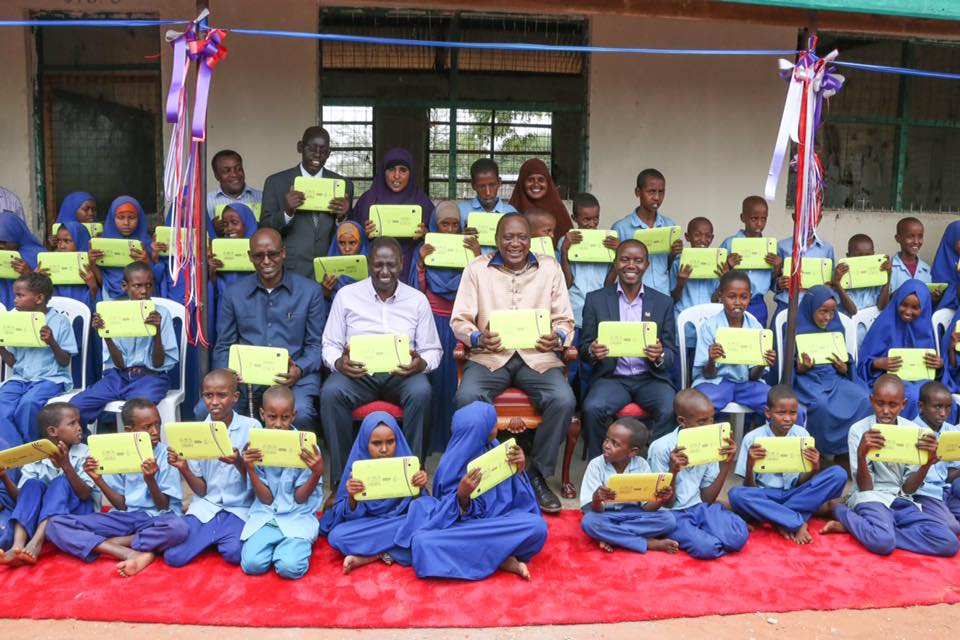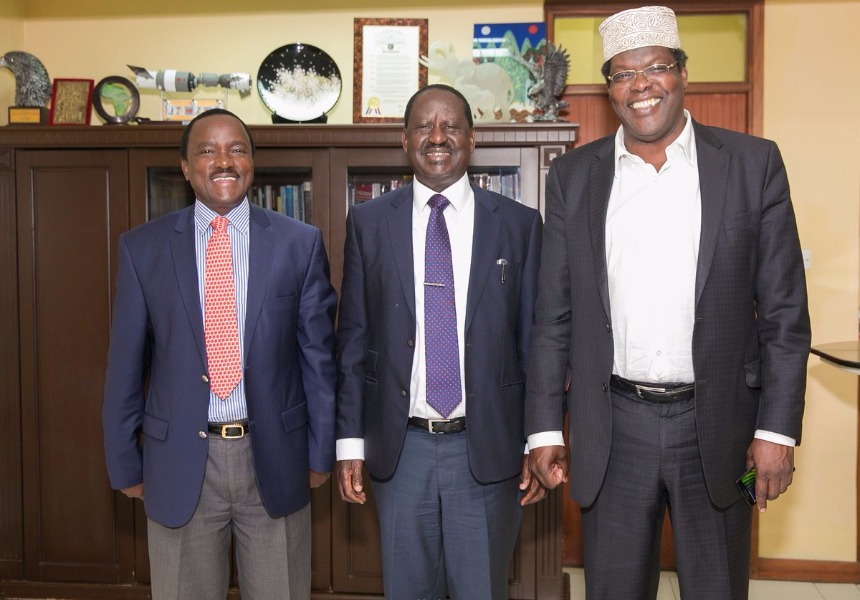The Kenya Private Sector Alliance (KEPSA) has called upon both the national and county governments to enhance awareness of waste categories and enforce waste collection at source in the country.
Speaking today at a side event commemorating the UNEP@50 celebrations, Carole Kariuki, Chief Executive of KEPSA, urged the removal of Cess charges on waste material being transported back to the producer to make it conducive for take-back schemes.
“The fees and levies on waste materials make it an expensive endeavor, with disposal being the preferred option. The sector financing mechanisms should be enhanced to grow more professional services and infrastructure development, such as material recovery facilities for sustainable waste management,” explained Kariuki.
In addition to the creation of decent green jobs in the sector through the formalization of the waste service providers, other benefits accrued would include effective waste management to significantly reduce emissions of greenhouse gases and pollution in Kenya.
Kariuki spoke on the topic ‘Rethinking Business and Private Sector Case Studies towards Circular Economy’ at the event, which also saw the launch of the Sustainable Waste Management Policy, and the National Marine Litter Management Action Plan.
The Sustainable Waste Management Policy and Bill, developed by the private sector in partnership with the Ministry of Environment and Forestry, are instrumental in redefining waste, promoting separation at source, and ensuring the end-to-end circulation of materials in the Kenyan economy. The policy and the bill aim to ensure the re-use of 95% of materials, products, and packaging injected into the economy, with only 5% to be disposed of in a sanitary landfill.
“The private sector is a significant contributor to the realization of sustainable development, especially in Kenya, where the economy is market-driven. Businesses have the power to bring solutions to scale and create real, transformative solutions to systemic social problems. Kariuki said she is confident that Kenya can transform the waste sector to be a major contributor to socio-economic recovery and growth of Kenya’s GDP at both the national and county levels.
Keriako Tobiko, Cabinet Secretary Ministry of Environment and Forestry, who officiated the event, said the launch of the Kenya National Sustainable Waste Management Policy and the National Marine Litter Action Plan demonstrates Kenya’s commitment to transitioning into a circular economy.
“Today’s launch underscores the importance of partnership and cooperation in finding solutions in Kenya’s sustainable plastics management and green recovery in line with the UNEA 5.2 resolution to establish a global agreement on ending plastic pollution through a legally binding instrument for sustainable development,” said Tobiko.
Inger Andersen, UNEP Executive Director, noted that under the United Nation’s Sustainable Development Goal number 12 – Sustainable Consumption and Production – if all product quantities adopted circularity, it would potentially unlock USD 4.5 trillion in economic growth and the creation of millions of jobs globally.
“When we design and produce with circularity in mind, we can get so much good for business and society. We take from the earth’s finite resources, which we can never take back when we make something new out of them. This is a question of foresight and insight. We, therefore, need to reduce, reuse, recycle, and refuse because you do not need a plastic bag to carry the five tomatoes home from the supermarket and discard it at the landfill, but we can get a cloth bag and reuse it even one thousand times instead,” she said.
According to KEPSA, the linear business model follows the “take-make-waste” model, contributing to the continued degradation of the environment by increasing dumpsites in the neighborhoods and pollution of rivers and water bodies with solid waste. Kariuki explained that KEPSA continues to champion the private sector in addressing pollution, efficient natural resource use, combating climate change, and enhancement of biodiversity.
Currently, waste recycling in Kenya is still low and is often complicated by the mixing of materials and composites. There is no guaranteed market for organic waste, which constitutes the bulk of the waste. As a result, solid waste management remains a major challenge in Kenya, especially for urban areas due to poor waste management systems, population pressure, and structural challenges.
Other challenges include low durability of goods, low collection rates, illegal and uncontrolled dumpsites where leachate pollutes waterways and underground aquifers, and where burning waste emits toxic air and noxious fumes that contaminate the air.
While outlining KEPSA’s contribution to the sustainable and inclusive business practices debate, Kariuki said private sector investment has gradually expanded in waste collection, transportation, sorting at material recovery facilities, recycling, as well as the production of marketable products from recovered materials.

Examples, she said, include Safaricom, which has reduced the size of SIM cards and removed over 200,000 single-use plastic pieces across the business value chain and aspires to go SIMless by 2030. The Coca-Cola Company, through its world without waste initiative, has redesigned the color of its green Sprite bottle to a clear bottle to make it possible to increase the recycling rate of PET bottles.
Under KEPSA, the Sustainable Inclusive Business Kenya (SIB-K) program has also successfully implemented the Creating Opportunities and Alleviating Poverty through Sustainable Trade (COAST) Project. More than two hundred women and youth have been trained in creating value from waste, financial literacy, and entrepreneurial skills. Thirteen business cases have been developed and awarded seed funding from the project with project linkages between the private sector and the beneficiaries to create value from waste.

In line with the Ministerial Stakeholder Forum Resolution of August 2019, the private sector has worked closely with the Ministry of Environment and Forestry in developing Mandatory Extended Producer Responsibility Regulations. These are intended to lead the establishment of take-back schemes, enhance the lifecycle approach to natural resources management and the creation of traceability systems for products and packaging under the EPR framework. Kenya will be the second country after South Africa to implement mandatory EPR compliance schemes for key products such as electronic waste, packaging, oils, and lubricants, among others.
This is in addition to the Kenya Plastics Pact (KPP) launched in 2021, which is a collaborative multi-stakeholder platform established in Kenya and being implemented under SIB-K. Thirty-two members and supporters have already signed up to the pact based on the global Ellen MacArthur Foundation’s New Plastics Economy model of elimination, innovation, and circulation to help Kenya transition from a linear to a circular economy. Kariuki called on more private sector members to join the Pact, and together create a circular economy for plastics, where it never becomes waste.
A circular economy is a zero-waste economy made of circular loops that prioritize the reduction of waste and pollution by design, the circulation of material in the economy as many times as possible, and the regeneration of natural ecosystems. In this model, all materials are reused in the economy with a focus on maximum extraction of value.




